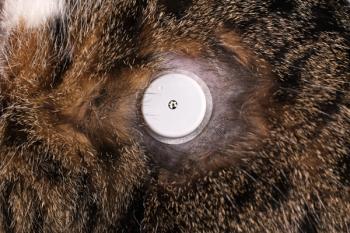
Microchip chatter
June is national pet preparedness month, so prepare to talk about microchips and their role.
Let clients know that a microchip could reunite them with their pet in the event they ever get separated. (Shutterstock.com.)June is National Pet Preparedness Month, making May a perfect time to get your clients up to speed on microchips. Time to target new clients and all clients in your database who don't have a microchip on file with succinct, powerful communication that will move them to action. Here's how the conversation could go:
Team member: Our records indicate that Buddy doesn't have a microchip on file. Do you know if he's microchipped?
[Client's answer doesn't really matter here.]
Team member: I'm going to go ahead and scan your pet to see if he's microchipped and, if he is, to get the chip number.
[No chip on scan.]
Team member: Looks like Buddy doesn't have a microchip. Can I tell you more about microchipping and how it would help you locate Buddy if you got separated?
Client: I'm not interested.
Team member: OK. Do you mind if I ask why for medical records purposes?
[The client often talks herself into having it done at this point.]
Or …
Client: Yes, that would be fine.
Team member: A microchip is an easy, inexpensive, nonpainful technology that lets animal control organizations, shelters and veterinarians know who to call if Buddy were to get lost.
Microchips are the size of a grain of rice. They function as a form of ID that's implanted under a pet's skin. The chip is encrypted with a unique number used to identify Buddy and you as his owner. It doesn't require a battery and is reliable for Buddy's entire life.
We'll inject the chip between Buddy's shoulders in much the same way we would give a shot. Once the chip has been implanted, you'll register Buddy with his name and your name and contact information in an online registry that's accessible worldwide. This safeguards Buddy against an “identity crisis” if he's ever separated from you.
We can put it in today. Would you like to go ahead and do that?
Dr. Sarah Wooten is an associate veterinarian in Greeley, Colorado, a frequent contributor to dvm360.com and a speaker at the Fetch dvm360 conferences.
Newsletter
From exam room tips to practice management insights, get trusted veterinary news delivered straight to your inbox—subscribe to dvm360.






